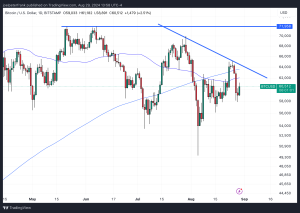Last updated:
 Why Trust Cryptonews
Why Trust Cryptonews

Blockchain security firm Chainalysis released a mid-year update on crypto crime on August 29, revealing a big rise in “pig butchering” scams within the cryptocurrency market in 2024.
These scams involve bad actors “fattening up” their victims by promising them high returns and then “slaughtering” them by disappearing with their funds.
Evolving Trend on Pig Butchering Scams
According to the report, 43% of this year’s scam inflows have been funneled into wallets created in 2024, with many of these linked to pig butchering schemes.
One of the largest scam wallets uncovered this year is associated with Myanmar’s KK Park, a known perpetrator of pig butchering scams. The wallet has already amassed over $100 million.
Nevertheless, the report highlighted the success achieved by law enforcement, which has improved the dismantling of long-term Ponzi schemes.
As a result, crypto thieves are now switching to shorter scams that last only a few weeks. In fact, the average lifespan of crypto scams has dropped from 271 days in 2020 to 42 days in 2024. This shift shows that scammers are adapting and becoming more sophisticated. They’re now using a mix of online and offline methods to carry out their scams, making them harder to catch.
Scammers are using two methods to trick victims.
First, they create new cryptocurrency wallets to hide their identities. Second, they buy existing social media profiles from platforms like Facebook and Tinder, often sourced from China-based service providers.
These profiles are made to look trustworthy and have a history of activity and connections. Scammers use them to gain victims’ trust and convince them to invest in fake cryptocurrency projects. The market for these illicit accounts has grown, with over $10 million in crypto flows attributed to this trade in the past two years.
Eric Jardine, Chainalysis’s cybercrimes research lead, noted that victims of these scams include the elderly, individuals in transitional life phases, and those seeking friendship or romance online. The personal nature of these scams makes them particularly insidious and effective.
Illicit Marketplaces Fueling the Fire And Recent Law Enforcement Actions
Chainalysis report also exposed Huione Guarantee as a key illicit marketplace, processing over $49 billion in cryptocurrency transactions since 2021.
This platform is a hub for various illegal activities, including pig butchering scams, investment fraud, money laundering, and connecting buyers and sellers on messaging apps like Telegram.
However, amidst these challenges, law enforcement agencies have scored some victories against pig butchering operations.
U.S. prosecutors in North Carolina recently seized nearly $5 million worth of Tether (USDT) linked to a pig butchering scam.
Responding to this, FBI agent Robert DeWitt emphasized the need for law enforcement to stay ahead of evolving criminal tactics, stating, “As cyber-enabled fraud continues to adapt, so must the FBI and its partners.”
He added that the recent cryptocurrency seizure is a testament to the FBI’s commitment to protecting victims from such schemes in the digital age.
Similarly, on August 19, Shan Hanes, former CEO of Heartland Tri-State Bank in Kansas, was sentenced to over 24 years in prison for embezzling $47.1 million to fund a pig butchering scheme he had fallen victim to.
In a related effort to raise awareness, the U.S. Federal Trade Commission (FTC) issued a warning in June 2024, highlighting the surge in pig butchering scams, particularly those involving romance and cryptocurrency investments.

















